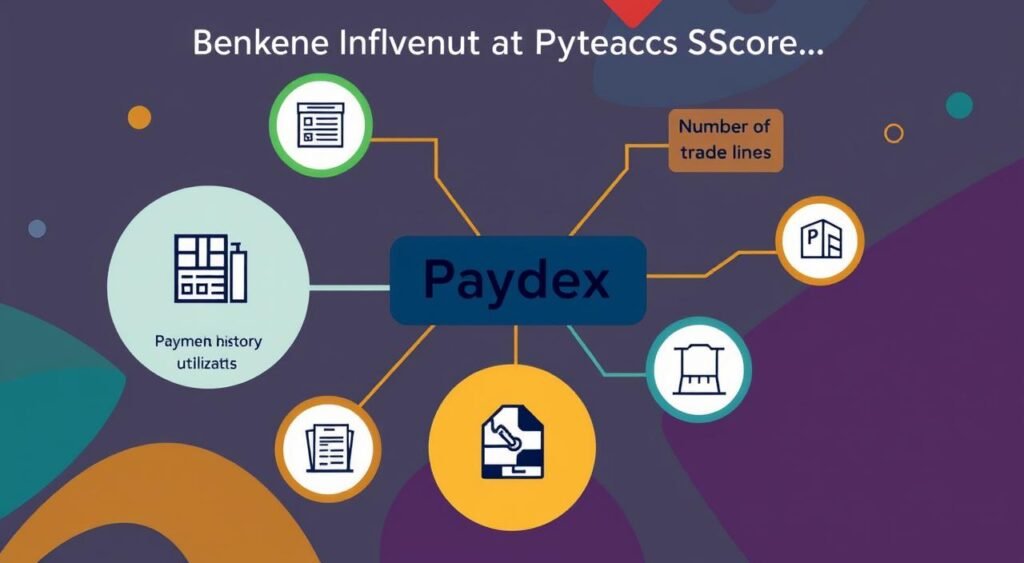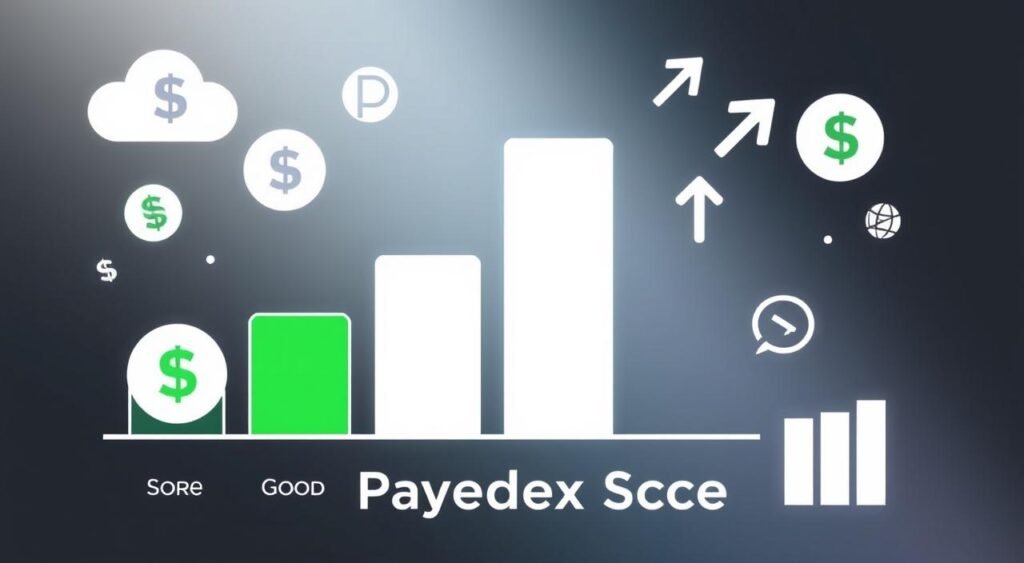Did you know that businesses with a Paydex score of 80 or higher are more likely to get funding without extra collateral? This score, made by Dun & Bradstreet, goes from 0 to 100. It shows how well your business pays its bills12. Getting a score of 75 or higher means you can get different kinds of loans. This shows lenders you’re not a big risk1.
In today’s market, knowing your Paydex Score is key. It helps you see how good your credit is. It also helps you get better loan terms3.
In this section, you’ll learn why the Paydex Score matters for business loans. You’ll see how it affects your financial chances. Knowing about your Paydex Score helps you make better choices. This can make your business financing journey better.
Key Takeaways
- The Paydex score ranges from 0 to 100, impacting business financing eligibility.
- A score of 75 or higher indicates low risk and timely repayments.
- Businesses require at least three trade experiences for a Paydex score calculation.
- Paying vendors on time significantly enhances your Paydex score.
- Lenders often look for a minimum score of 80 to ensure timely payment history.
Understanding the Paydex Score
The Paydex Score is key to knowing your business’s financial health. It’s made by Dun & Bradstreet and looks at how you pay suppliers and lenders. Scores range from 0 to 100. A score over 80 means you’re seen as low risk by creditors and insurers. But, scores under 80 might show payment problems4.
Knowing your Paydex Score is vital for getting good Paydex Score Business Loans.
What is a Paydex Score?
A Paydex Score shows how well a company pays its bills. It’s based on the value of your payments, with bigger payments counting more5. Only payments from the last two years matter4. A high score means you pay on time, while a low score means you might be late.
There are three risk levels: low risk (80-100), medium risk (50-79), and high risk (0-49)6.
Importance of the Paydex Score
The Paydex Score is crucial for your business credit score and financial health. It helps decide if you’ll get a loan and what terms you’ll get. For example, a score of 80 or higher might get you the best loan rates without needing a perfect score4.
A good Paydex Score means more financing options and trust from lenders. This can really help your business grow.
How is the Paydex Score Calculated?
The Paydex Score is key to knowing your business credit health. It looks at factors influencing Paydex Score through a detailed algorithm. This algorithm checks your payment practices. These factors are important for lenders to assess your business credit.
Factors Affecting Your Paydex Score
Your Paydex Score comes from payments over the last two years. It ranges from 0 to 100. Scores can offer discounts for early payments and penalties for late ones7.
Making payments on time boosts your score. Payments made early can get you a perfect score of 100. This shows you have a great payment history8.
The number and quality of trade references also matter. Having at least three active trade references from different suppliers is crucial. It shows you pay on time consistently. Companies with three or more tradelines are seen as more reliable, affecting your Paydex Score.
The Role of Trade References
Trade references are very important for your Paydex Score. These references come from vendors who report to Dun & Bradstreet. They show how well you handle your financial duties.
More trade references can help your Paydex Score. Small businesses have seen a big increase in trade references since 20107. This growth highlights the value of good relationships with suppliers and vendors for better credit.

What is a Good Paydex Score?
A good Paydex Score is key for businesses wanting better loan terms. Knowing the score ranges can help a lot in getting financing. Dun & Bradstreet’s Paydex Score goes from 0 to 100. A score of 80 means you pay on time, and scores from 80 to 100 show you’re low risk for lenders.
Having a low-risk score can help you get loan approvals and better terms910.
Score Ranges Explained
The scoring system breaks down Paydex Scores into three main ranges:
| Score Range | Risk Level |
|---|---|
| 80-100 | Good |
| 50-79 | Fair |
| 0-49 | Bad |
Keeping a good Paydex Score is crucial. It shows your payment history9. Other credit scores like FICO and Experian also have their own ranges. They can help you see your overall creditworthiness10.
How Businesses Can Optimize Their Scores
To get and keep a good Paydex Score, businesses should:
- Pay on time or early to creditors.
- Have multiple trade references to show credibility.
- Talk to suppliers to fix payment problems.
- Check your scores with credit agencies often.
By doing these things, you can improve your Paydex Score. This makes your business more appealing to lenders and partners910.

Paydex Scores and Business Loans
It’s key to know how lenders use Paydex Scores when deciding on loans. A high score means you pay on time, which helps get better loan terms. These scores help lenders see if lending to your business is safe.
How Lenders Use the Paydex Score
Lenders check the Paydex Score to see if you’ll pay back loans on time. A score of 80 or higher means you pay bills on or before they’re due11. A good score makes it more likely you’ll get a loan.
The Impact of Your Score on Loan Terms
Your Paydex Score affects the loan terms you get, like interest rates and how long you have to pay back. If your score is high, you might get lower interest rates and longer to pay back. But, a low score could mean higher costs or no loan at all12. A high score means you might get better financial deals.
| Paydex Score Range | Implication | Loan Terms |
|---|---|---|
| 81-100 | Very Good | Lower interest rates, extended terms |
| 61-80 | Good | Average rates and terms |
| 41-60 | Fair | Higher rates, limited terms |
| 21-40 | Poor | Very high rates, tight terms |
| 1-20 | Very Poor | Application denials, very high costs |
In short, the Paydex Score is very important for lenders when deciding on loans1112.
Why Your Paydex Score Matters for Business Financing
Your Paydex Score is key in showing how trustworthy your business is. It affects the loans and credit you can get. A high score means you pay on time, which lenders like. This can lead to better loan terms and lower interest rates13.
On the other hand, a low score might make it hard to get loans. This can slow down your business’s growth and stability.
Connection to Creditworthiness
The Paydex Score goes from 1 to 100, with higher numbers showing better payment habits14. Keeping your score high means your business is seen as reliable. This makes working with vendors easier.
It’s important to have a good score to get the best deals. You need to pay on time to many suppliers to build a strong score14.
Influence on Funding Options
A high Paydex Score can open up many funding options for your business. This includes loans, lines of credit, and better terms from vendors. A score of 80 or higher can even lower your insurance costs and give you longer loan terms13.
But, a low score can limit your choices. This can make it harder to get the money you need. Keeping your score up is key to staying competitive.

“Your creditworthiness is critical to unlocking various funding options.”
| Paydex Score Range | Implications | Funding Options |
|---|---|---|
| 1 – 49 | Significant payment delays | Limited financing opportunities |
| 50 – 69 | Inconsistent payments | Higher interest rates |
| 70 – 79 | Generally acceptable | Standard funding options |
| 80 – 100 | Consistent on-time payments | Lower risk loans and favorable conditions |
Keeping an eye on your Paydex Score can help you get the funding you need. This makes your business stronger141315.
Improving Your Paydex Score for Better Loan Approval
Boosting your Paydex Score is key to getting loans on better terms. A high score, like 80 or above, shows you pay on time. This opens up more funding options. We’ll look at ways to improve your score, like making timely payments and building strong trade relationships.
Tips for Timely Payments
To boost your Paydex Score, paying on time is crucial. Here are some tips:
- Talk to suppliers about payment terms to ensure you can pay on time.
- Keep an eye on your payment schedule to avoid late payments.
- Pay big bills first since they count more towards your score.
- Always aim to pay on time or early. This shows you’re responsible and helps your score1617.
Establishing Strong Trade Relationships
Good trade relationships can really help your Paydex Score. Being positive with vendors can make them report good experiences to Dun & Bradstreet. This can improve your credibility. Here’s how to build these relationships:
- Stay in touch with your suppliers to build trust and make sure they have your correct info.
- Pay your bills quickly to strengthen your case for better credit terms later.
- Look for vendors who report to Dun & Bradstreet. This can directly help your score1617.
By using these strategies, you can improve your Paydex Score. This can lead to better loan terms. Keep paying on time and work on your trade relationships to show lenders you’re reliable.
The Role of Dun & Bradstreet in Business Credit
Dun & Bradstreet is key in shaping your business credit. Getting a D-U-N-S number is the first step. This number is vital for your credit file and Paydex Score. It helps lenders and suppliers see if you pay on time.
How to Obtain a D-U-N-S Number
Getting a D-U-N-S number is easy. You just need to give your business details like name and address. This number is the base of your Dun & Bradstreet profile and is important for tracking your Paydex Score.
Monitoring Your Paydex Score with Dun & Bradstreet
Keeping an eye on your Paydex Score is crucial. It shows if you pay bills on time, from 1 to 100. A score of 80 or higher is good for loans18. Checking it often helps fix problems before they get worse. Dun & Bradstreet lets you track your score, helping you get better loans and partners19.
| Criteria | D-U-N-S Number | Paydex Score Monitoring |
|---|---|---|
| Purpose | Establish business identity | Track payment reliability |
| Importance | Essential for credit file creation | Influences loan approval chances |
| Score Range | – | 1-100 |
| Desired Outcome | Secures your business | Achieve 80+ for favorable terms |
Working with Dun & Bradstreet on your D-U-N-S number and Paydex Score can really help your business. Knowing your scores helps plan your funding. It’s key in today’s competitive world1819.
Common Misconceptions about Paydex Scores
Knowing about business credit is key for good lender relations. Many think a perfect Paydex Score of 100 is needed for good loans. But, a score of 80 or higher is often enough to show a business is trustworthy. To get a perfect score, businesses must pay bills early, which is hard for many20.
Do You Need a Perfect Score?
Chasing a perfect score can be stressful and unrealistic. While a high score is good, focus on making timely payments and using credit wisely. Paying bills on time each month helps build a strong business credit score20. Remember, building good credit takes time, not just one effort.
Understanding Business Credit vs. Personal Credit
Business and personal credit are different. Business credit shows how well your company pays, while personal credit reflects your financial habits. Not every business has a credit report or score; it needs to be set up through credit bureaus like Dun & Bradstreet, Experian, Equifax, and others21. Getting a D-U-N-S number is the first step for businesses to see their score on Dun & Bradstreet21.
There are also myths about getting credit. Over half a million vendors are willing to give credit, but only about six thousand report to corporate credit offices22. A high Paydex score can get banks’ attention, but other factors like personal credit and business history are also important22.
Conclusion
Understanding your Paydex Score is key to better financing for your business. Scores range from 0 to 100, with 80 or above being good. This shows you’re a low-risk borrower2324.
Making payments on time to suppliers and creditors helps a lot. It shows you’re reliable and boosts your creditworthiness2324.
To get better loan deals, work with Dun & Bradstreet. They help you keep an eye on your score and build strong trade relationships2425. Keeping your finances healthy and reporting credit activities correctly is crucial2425.
By focusing on these steps, you can improve your Paydex score. This opens up better loan terms and partnerships for your business.
Knowing your Paydex score well and keeping it up helps your business grow. It prepares you for success in a tough financial world. Use these strategies to find better financial chances and improve your business’s standing with lenders, suppliers, and clients2325.
FAQ
What is a Paydex Score?
Why is the Paydex Score important for obtaining business loans?
How is the Paydex Score calculated?
What score range indicates a good Paydex Score?
How can I improve my Paydex Score?
How do lenders use the Paydex Score to assess loan applications?
What funding options are available for businesses with good Paydex Scores?
What role does Dun & Bradstreet play in my business credit profile?
Do I need a perfect Paydex Score for favorable financing?
How does my Paydex Score impact relationships with vendors?
Source Links
- PAYDEX Score: The Dun & Bradstreet Business Credit Rating – https://www.nav.com/business-credit-scores/dun-bradstreet-paydex/
- PAYDEX Score: The Only Ultimate Guide You Need To Read – https://www.forbes.com/advisor/credit-score/paydex-score/
- Understanding the Paydex Score – https://www.businessinsider.com/personal-finance/credit-score/what-is-paydex-score
- What Is A Paydex Score? | Bankrate – https://www.bankrate.com/credit-cards/business/what-is-paydex-score/
- Understanding Business Credit Scores – Credit Strong – https://www.creditstrong.com/business/business-credit-scores/
- Understanding the Three Major Business Credit Bureaus – https://www.score.org/resource/article/understanding-three-major-business-credit-bureaus
- The PAYDEX score is calculated by the Trade algorithm which examines individual experiences, classifies them into various classes, weights them according to the dollar amounts for each category and then multiplies by the individual index weight to comput – https://docs.dnb.com/static/doc-uploads/supplier/en-US/support/FAQs.pdf
- PAYDEX® Business Credit Score Guide – Huddle Business Capital – https://huddlebc.com/blog/paydex-score-guide
- What Is a Good Business Credit Score? | Nav – https://www.nav.com/resource/what-is-a-good-business-credit-score/
- What Is a Good Business Credit Score? | OnDeck – https://www.ondeck.com/resources/business-credit-score-actually-mean
- D&B PAYDEX Score FAQ – Business Credit Score Guide – https://northshoreadvisory.com/business-credit/business-credit-scores/dnb-paydex-score-faqs/
- PAYDEX Business Credit Score: See What Yours Means – https://www.creditsuite.com/blog/decoding-the-paydex-business-credit-score/
- How Long Does It Take to Get an 80 PAYDEX Score? | Credit Suite – https://www.creditsuite.com/blog/paydex-score-80/?srsltid=AfmBOoorspCpflvfxGW4lny8Csu7LHV47Tl-RxNVz–pqV5tg8x7_BUh
- PAYDEX Business Credit Score: See What Yours Means – https://www.creditsuite.com/blog/decoding-the-paydex-business-credit-score/?srsltid=AfmBOorkSotBDkUBiQ_1QeNTxa_LRe09EOSbqO06yNcQpFnwE6XnHbyD
- SBSS Score Explained: What It Is and Why It Matters – https://www.business.com/articles/the-sbss-score-explained/
- How to Get a PAYDEX Score of 80: The Essential Guide – https://www.unitedcapitalsource.com/blog/paydex-score-80/
- How Long Does It Take to Get an 80 PAYDEX Score? | Credit Suite – https://www.creditsuite.com/blog/paydex-score-80/?srsltid=AfmBOoqtCBpt6RIhQCFUqN6ePpQ4PMcMjqqzgyDK92CKfd5bUjucYeSe
- Understanding the Importance of Business Credit: The Dun & Bradstreet (D&B) Rating – https://www.linkedin.com/pulse/understanding-importance-business-credit-dun-db-rating-pitcairn-cgsee
- Dun and Bradstreet Rating Guide | Bankrate – https://www.bankrate.com/credit-cards/business/what-is-db-rating/
- 5 Things That Won’t Hurt Your Business Credit Score | Nav – https://www.nav.com/blog/x-things-that-wont-hurt-your-business-credit-score-20049/
- Business Credit Bureau: 4 Misconceptions to Understand – https://www.creditsuite.com/blog/business-credit-bureau/?srsltid=AfmBOoqAibqCp0Q9_AkMoP5Ha9phniyZe2jGdeaRPnbnF-h7EdILMlD2
- Top 10 Business Credit Myths – Sheen Magazine – https://www.sheenmagazine.com/top-10-business-credit-myths/
- Understanding the PAYDEX Score: Your Business’s Credit Score 📊🏢 – https://www.linkedin.com/pulse/understanding-paydex-score-your-businesss-credit-paul-a-damiano-l3t4e
- PAYDEX Score: The Dun & Bradstreet Business Credit Rating – https://ramp.com/blog/what-is-a-paydex-score
- Paydex Scores: Your Key to Small Business Financial Success. – https://www.paycron.com/blog/unlocking-financial-success-a-comprehensive-guide-to-paydex-scores-for-small-businesses

